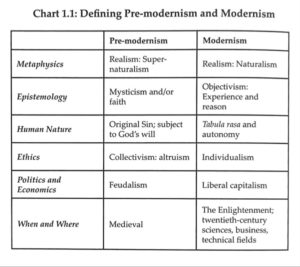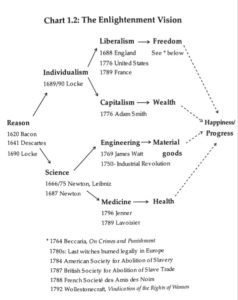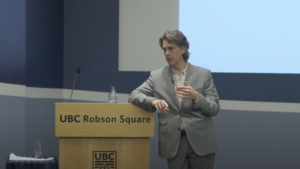Rejected Measurable Truth = Inconsistencies = Obscurantism
Explaining Postmodernism: What is he talking about anyway?
In his book “Explaining Postmodernism: Skepticism and Socialism from Rousseau to Foucault,” author Stephen R. C. Hicks explores the philosophy of postmodernism and its effects on politics, cultural practices, and individual lives. His book takes a dive into the history, major figures, and contemporary ramifications of postmodernism.
Hicks defines postmodernism as a philosophical and historical movement of the late 20th century that questions the validity of established standards of veracity, objectivity, and logic. It downplays the importance of universal truths claimed by grand narratives in favor of personal accounts and unique viewpoints. Postmodernism, as argued by Hicks, has had a major impact on many fields, from politics to architecture.
Hicks begins by tracing the beginning of postmodernism in the writings of major Enlightenment thinkers like Jean-Jacques Rousseau and Immanuel Kant. Postmodernism, he says, developed in response to the Enlightenment’s value of reason, science, and technological advancement. Postmodern thinkers criticized the Enlightenment’s optimism in human progress and the veracity of objective truth in favor of skepticism and a more relative perspective on knowledge.
According to a lecture I found of him in 2018 he states that the following “big names” are the “leading intellectual heavyweights guiding this movement.”
Michel Faucault – Read more about him here.
Richard Rorty – Read more about him here.
Jaques Derrida – Read more about him here.
Jean François Lyotard – Read more about him here.
An important idea in this book is that postmodernism and socialism are linked. Hicks argues that postmodernism’s emphasis on relativism and the devaluation of objective reality makes it a natural fit with socialist ideologies that place a premium on group solidarity and government planning. According to Hicks- Postmodernist concepts have permeated many sectors, contributing to the proliferation of identity politics and the undermining of personal liberties.
Rejected Measurable Truth = Inconsistencies = Obscurantism
The effects of postmodernism on culture are further emphasized by Hicks. He maintains that the whole basis of rational discussion and academic inquiry is threatened by postmodernism’s rejection of objective truth and reason. Since there are no longer any standards by which to judge one viewpoint against another, and communication breaks down. He also argues that postmodernism’s insistency on the individual experience and identity politics can inhibit honest communication and stunt social development as a whole.
Despite its comprehensive explanation of postmodernism and its ramifications, “Explaining Postmodernism” has not been immune to criticism. Some have argued that Hicks reduces too much of the complexities inherent in postmodern philosophical thought. Critiques on blogs throughout argue that he is ignoring the variety of thinking within postmodernism by labeling it as necessarily socialist. I also found evidence of others views stating that his philosophical learnings, which support individualism and capitalism, may skew his understanding of postmodernism.
Despite these critiques: “Explaining Postmodernism” is still an excellent read for anybody curious about postmodernism’s history, philosophy, and legacy. I personally recommend skipping the book and listening to the lecture I posted above. Hicks provides an understandable introduction to a wide range of philosophical ideas. He lays the groundwork for readers to have fruitful discussions about postmodernism’s place in modern culture by analyzing its historical context and main ideas. It also provides a thorough examination of the philosophy’s background, central figures, and social effects. The book is helpful for grasping the complicated concepts at the heart of postmodernism, despite the fact that it may be criticized for simplifying and possible bias by some. Whether you agree with Hicks’ interpretation or not, you can’t deny that “Explaining Postmodernism” adds to the ongoing discussion of this significant intellectual trend.
7 responses to “Rejected Measurable Truth = Inconsistencies = Obscurantism”
Leave a Reply
You must be logged in to post a comment.



Hi Alana,
Great work summarizing Hick’s work! Since Dr. Clark mentioned Mounk’s recent book on identity politics, I’ve listened to a few of his podcasts. He talks a lot about Foucault. What’s fascinating about this post-modern giant is that he dismissed the idea of there being any “grand narrative.” Not only that, he sees Marxism as a grand narrative. Postmodernism’s blind allegiance to both dismissing grand narratives and yet not seeing the grand narrative behind Socialism is baffling. In the words of Hicks, “That is my second hypothesis: Postmodernism is a response to the crisis of faith of the academic far Left. Its epistemology justifies the leap of faith necessary to continue believing in socialism, and that same epistemology justifies using language not as a vehicle for seeking truth but as a rhetorical weapon in the continuing battle against capitalism.” (p. 91)
Whoa.
That is some quote!
Thanks for sharing David
Great post, Alana. Thanks for the breakdown. I agree with your point of view and wonder where you see inconsistencies and/or obscurantism? In general or in your own world.
Thanks!
Hi Alaina
Great and helpful summary. I appreciate that you brought criticism of Hick’s book. “Critiques on blogs throughout argue that he is ignoring the variety of thinking within postmodernism by labeling it as necessarily socialist. I also found evidence of others views stating that his philosophical learnings, which support individualism and capitalism, may skew his understanding of postmodernism.”
I found the overt connection between postmodernism and socialism a bit curious. As hicks points out, postmodernist by definition are not a monolith of thought. It is mostly deconstructing modernist views from multiple angles while resisting categorical summation. Do you think this critique of Hicks is valid or has Hick’s found a thread of connection among various postmodern perspectives?
Alana,
I enjoyed your post and reading the comments above.
I am curious how this could impact Fred’s….if the full impact were made?
“Hicks argues that postmodernism’s emphasis on relativism and the devaluation of objective reality makes it a natural fit with socialist ideologies that place a premium on group solidarity and government planning”
Kristy, I was going to ask this very same question! Okay, Alana, I will go one step further. How does this impact the orphanage in Nepal? In what ways can you implement what you have learned about postmodernism into your ministry?
Alana – Thanks for the video link! I will check that out. I also thought that Hicks’ bias against post-modernism was apparent in this book, but you made a great point that his summary and tracing of the philosophical eras are helpful to the broader discussion, regardless.